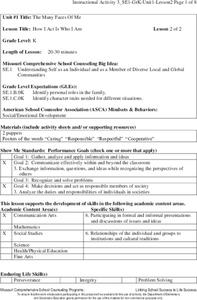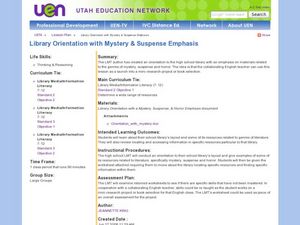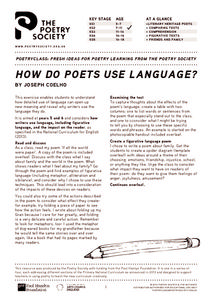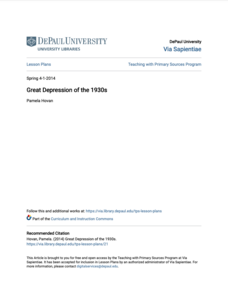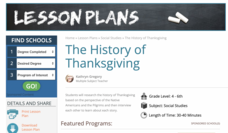Missouri Department of Elementary
How I Act Is Who I Am
A lesson centers itself around the topic of family roles. A whole-class discussion uses puppets and posters to go in-depth into the following character traits; caring, responsibility, respect, and cooperation. The discussion closes with...
Curated OER
Literature in the Library
High schoolers get familiar with their school library. In this library orientation instructional activity, students explore the layout of the library and challenge high schoolers to locate literature materials in a scavenger hunt activity.
Steppenwolf Arts Exchange
Fahrenheit 451: Study Guide
Here's a must-have packet for your curriculum library. If you are interested in Fahrenheit 451, if you are interested in Ray Bradbury, if you are interested in censorship, if you interested in programs that make a difference, then...
Film Foundation
To Kill a Mockingbird: What Is a Movie?
The challenge film makers face when creating a film based on a novel or nonfiction text is the focus of a interdisciplinary resource that uses To Kill a Mockingbird to teach viewers how to read the visual images of film. A...
Core Knowledge Foundation
Native Americans Tell It Again!™ Read-Aloud Anthology
A 154-page anthology explores the life, culture, and history of Native Americans. Eight lessons follow the routine of introducing the reading, conducting the reading, discussing it, doing word work, then taking part in an extension...
Core Knowledge Foundation
Farms Tell It Again!™ Read-Aloud Anthology
The thematic read-aloud anthology introduces young readers to life on a farm. The thoughtfully detailed resource offers three weeks of skills practice designed to boost reading comprehension skills. Lessons follow a routine of...
Poetry Society
How do Poets Use Language?
Why do writers choose the language they do? Here's a resource that has the poet himself answer that very question. Joseph Coelho explains why he chose the words and images he used in his poem, "If All the World Were Paper."
Curated OER
Let the Phone Get Them Talking! Using the Yellow Pages as a Teaching Resource
Students categorize information in the Yellow Pages. In this Let the Phone Book Get Them Talking! lesson, students find pictures in the Yellow Pages and thus gain a better understanding of how the book is organized. Students locate local...
Curated OER
Library Scavenger Hunt
Students work together to locate and identify resources in the library. They use the internet to answer research questions. They share the information they gathered with the class.
Curated OER
Animals Should Definitely Not Borrow Library Books
First graders practice borrowing library books. In this library lesson, 1st graders discuss what would happen if animals could borrow library books. They visit a website where they watch what would happen. They discuss how to care for...
Curated OER
ReReading America Lesson Three: Hands-on Practice
Students research, using a variety of sources, a topic that has been previously chosen. They evaluate their information for the value, relevance, and accuracy. Students identify problems in their research and writing to get assistance as...
Scholastic
Perfect Postcards: Illinois
Connect the geography and history of Illinois using an art-centered lesson on the railroads. The railroad connected once-distant places, particularly in the Midwest. Using research, class members create postcards of fictional cross-state...
Curated OER
Using Information Resources: Lesson 2
Students are introduced to the various information resources. Individually, they practice skimming the table of contents, glossary and photographs in the excerpts. To end the lesson, they identify key words and answer questions in a...
EngageNY
Researching Digital Sources, Part 1: Guided WebQuest
We are living in a technical world. Scholars learn how to examine digital resources for their research on DDT. They explore a list of websites using a Digital Resources on DDT sheet. Learners examine their research notebook to...
Via Sapientiae at DePaul University
The Great Depression of the 1930s
A 10-lesson unit takes young historians through a study of The Great Depression and life in the 1930s. The crash of the stock market, the Dust Bowl, unemployment, and mass migration west are all addressed through the analysis of primary...
Teaching Tolerance
Picture Books
Aspiring artists and budding writers combine their skills in an interactive lesson. Young scholars become authors when they create their own picture books focused on social justice. The resource guides learners through the writing and...
Facing History and Ourselves
After Charlottesville: Contested History and the Fight against Bigotry
History doesn't always reflect all sides. Academics discover how the remembered history of the Civil War differs for White and African Americans. The lesson explores how Civil War monuments and celebrations have racist connotations for...
Facing History and Ourselves
Understanding Identity
Key to social-emotional learning is understanding who we are. The first activity in an Understanding Identity unit asks class members to consider the factors that shape one's concept of themselves, the parts of their identity they choose...
Teacher.org
The History of Thanksgiving
The first Thanksgiving is the focus of a lesson that boosts reading comprehension and interview skills. Half the class reads about Pilgrims while the other half reads about the Native American, Squanto. After answering questions, pupils...
Facing History and Ourselves
The 1968 East LA School Walkouts
The East LA School walkouts are the focus of a instructional activity that looks at the importance of an education that honors the culture of all learners. Class members watch videos and read an article on the LA student demands to...
Facing History and Ourselves
Speaking Up and Speaking Out
The final lesson in the Standing Up for Democracy unit offers class members a way they can stand up and speak out by crafting spoken word poetry, or Slam poetry. After analyzing several examples, individuals reflect on one positive...
Facing History and Ourselves
Defining Our Obligations to Others
Introduce young learners to the concept of a Universe of Obligation, a term coined by sociologist Helen Fein, with a instructional activity that asks learners to consider the extent to which they feel a responsibility for others. Class...
Library of Congress
Women's Suffrage Movement Across America
An engaging resource provides many primary source materials to inform a study of the Women's Suffrage Movement. Suggestions include building a timeline of the fight, using the documents as the basis of a DBQ, and/or using a Venn...
Curated OER
Introducing Jane Eyre
"How can a magazine reflect a particular time and culture?" Using this prompt, your class explores the Victorian Era as it relates to Charlotte Bronte's Jane Eyre. They can also play the "Victorian Women's Rights" game for the year 1840...
